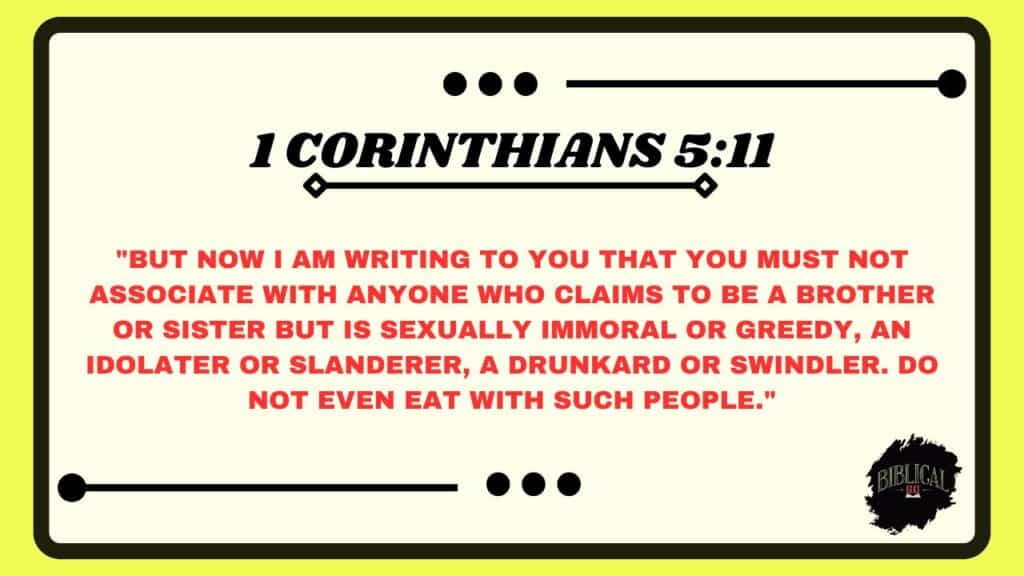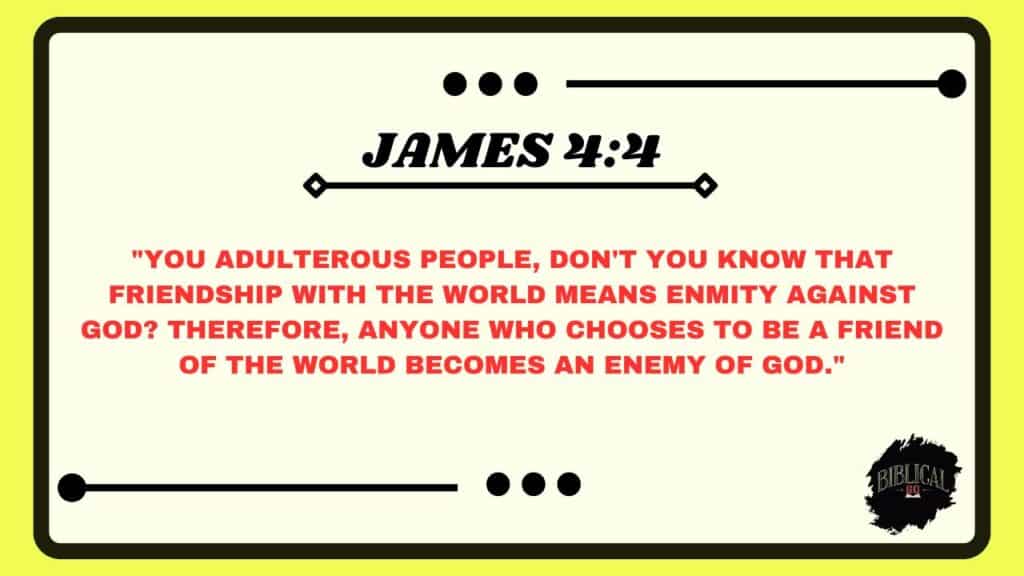Bible Verses About Removing People From Your Life: Life’s journey is filled with relationships that shape, challenge, and transform us. While Scripture teaches us to love one another, it also acknowledges that not all relationships are healthy or God-honoring.
The Bible offers profound wisdom about when and how to distance ourselves from certain individuals for our spiritual, emotional, and sometimes physical well-being.
Setting boundaries with toxic people isn’t about harboring unforgiveness or acting in hatred. Rather, it’s about stewarding the life God has given you and protecting the calling He has placed on your heart. When relationships become destructive or lead us away from our faith, Scripture provides guidance on making these difficult decisions.
God’s Word offers balanced wisdom on this sensitive topic teaching us to love unconditionally while also recognizing when relationships need to change or even end. The following verses help us navigate these complex situations with godly discernment and grace.
Also Read: 37 Amazing Bible Verses About Sunsets (Explained)
When Relationships Threaten Your Spiritual Health
1. 1 Corinthians 15:33
“Do not be deceived: ‘Bad company corrupts good character.'”
This straightforward warning reminds us that the people we spend time with influence our character and behavior. When someone consistently pulls you toward ungodly behaviors or attitudes, it may be necessary to create distance to protect your spiritual health. Consider who has true spiritual influence in your life and whether that influence is positive or negative.
2. Proverbs 13:20
“Walk with the wise and become wise, for a companion of fools suffers harm.”
Solomon teaches that our companions shape our journey. Those who consistently demonstrate foolish behavior can bring harm into our lives. This verse encourages us to seek relationships with those who demonstrate godly wisdom, and sometimes that means stepping away from relationships that consistently lead to harmful outcomes.
3. 2 Thessalonians 3:6
“In the name of the Lord Jesus Christ, we command you, brothers and sisters, to keep away from every believer who is idle and disruptive and does not live according to the teaching you received from us.”

Paul instructs believers to distance themselves even from other Christians who live in persistent disobedience or cause disruption in the community. This doesn’t mean abandoning them completely, but creating appropriate boundaries until repentance occurs. Consider how you might maintain limited contact while not enabling destructive patterns.
4. Psalm 1:1
“Blessed is the one who does not walk in step with the wicked or stand in the way that sinners take or sit in the company of mockers.”
This psalm describes a progression of involvement with ungodly influences walking, standing, and sitting suggest increasing levels of engagement. The blessed person avoids being shaped by those who mock God and His ways. Examine your relationships for those who consistently mock faith and godly living.
5. 2 Corinthians 6:14
“Do not be yoked together with unbelievers. For what fellowship has righteousness with lawlessness? And what communion has light with darkness?”
While often applied to marriage, this principle extends to all close partnerships. Being “yoked” implies a binding, influential relationship. Paul warns that fundamental differences in values and beliefs can create painful tension and compromise. Consider where you might be unequally yoked in ways that consistently pull you from your faith.
6. Romans 16:17
“I urge you, brothers and sisters, to watch out for those who cause divisions and put obstacles in your way that are contrary to the teaching you have learned. Keep away from them.”
Paul cautions against those who create division in the church through false teaching. These relationships require careful boundaries to protect both individual faith and community unity. When someone consistently undermines biblical teaching or sows discord, separation may become necessary for the health of the church body.
When Relationships Become Abusive or Destructive
7. Proverbs 22:24-25
“Do not make friends with a hot-tempered person, do not associate with one easily angered, or you may learn their ways and get yourself ensnared.”
This wisdom directly warns against close relationships with people prone to anger and violence. Such relationships can become dangerous and may even normalize these behaviors in your own life. If you’re dealing with someone consistently filled with rage, Scripture permits appropriate distance for safety.
8. Proverbs 23:9
“Do not speak to fools, for they will scorn your prudent words.”
This verse addresses the futility of trying to reason with someone who consistently rejects wisdom. When a person repeatedly scorns sound advice and godly counsel, continued engagement may prove unproductive. Sometimes stepping back allows space for God to work in ways your words cannot.
9. Matthew 10:14
“If anyone will not welcome you or listen to your words, leave that home or town and shake the dust off your feet.”
Jesus instructed His disciples to move on when their message was rejected. While maintaining a loving attitude, they were not to continue investing time where it wasn’t valued. This principle can apply to relationships where your care, concern, and truth are consistently rejected or met with hostility.
10. Proverbs 14:7
“Stay away from a fool, for you will not find knowledge on their lips.”
The Bible defines foolishness not as intellectual deficiency but as moral and spiritual rebellion. A fool rejects God’s wisdom and pursues destructive paths. This verse advises creating distance from those committed to foolishness to protect yourself from their harmful influence.
11. Titus 3:10-11
“Warn a divisive person once, and then warn them a second time. After that, have nothing to do with them. You may be sure that such people are warped and sinful; they are self-condemned.”
Paul provides a clear process for handling divisive individuals: two warnings followed by separation if the behavior continues. This measured approach balances patience with protection of the community. When someone persists in causing division despite loving correction, distance becomes appropriate.
12. Proverbs 22:10
“Drive out the mocker, and out goes strife; quarrels and insults are ended.”
This proverb recognizes that removing contentious individuals from a situation often resolves conflict. While sounding harsh, this principle acknowledges that some people consistently generate strife, and their removal creates space for peace and healing.
Setting Boundaries While Maintaining Love
13. Matthew 18:15-17
“If your brother or sister sins, go and point out their fault, just between the two of you. If they listen to you, you have won them over. But if they will not listen, take one or two others along, so that ‘every matter may be established by the testimony of two or three witnesses.’ If they still refuse to listen, tell it to the church; and if they refuse to listen even to the church, treat them as you would a pagan or a tax collector.”
Jesus outlines a process for addressing sin within the community, culminating in treating an unrepentant person as “a pagan or tax collector.” This didn’t mean hatred, but rather a change in relationship status and fellowship. This teaches us that loving someone doesn’t always mean maintaining the same level of relationship.
14. Romans 12:18
“If it is possible, as far as it depends on you, live at peace with everyone.”
Paul acknowledges the reality that peace isn’t always possible in every relationship. The phrase “if it is possible” and “as far as it depends on you” suggests that sometimes, despite our best efforts, distance may be necessary when others refuse peace. This verse gives permission to recognize when you’ve done all you can.
15. Ephesians 5:11
“Have nothing to do with the fruitless deeds of darkness, but rather expose them.”
While maintaining loving attitudes, believers are called to separate themselves from darkness. This doesn’t necessarily mean cutting off relationships entirely, but it does mean refusing to participate in sinful activities and sometimes establishing clear boundaries with those who persist in them.
16. 2 Timothy 3:1-5
“But mark this: There will be terrible times in the last days. People will be lovers of themselves, lovers of money, boastful, proud, abusive, disobedient to their parents, ungrateful, unholy, without love, unforgiving, slanderous, without self-control, brutal, not lovers of the good, treacherous, rash, conceited, lovers of pleasure rather than lovers of God having a form of godliness but denying its power. Have nothing to do with such people.”
Paul describes toxic character traits and advises Timothy to avoid close relationships with people displaying these patterns. This passage gives believers permission to distance themselves from those exhibiting consistently destructive behavior, even when they claim religious affiliation.
17. 1 Corinthians 5:11
“But now I am writing to you that you must not associate with anyone who claims to be a brother or sister but is sexually immoral or greedy, an idolater or slanderer, a drunkard or swindler. Do not even eat with such people.”

Paul instructs believers to establish boundaries with those claiming to be Christians while living in unrepentant sin. This separation wasn’t about rejection but accountability. Sometimes loving distance communicates the seriousness of sin more effectively than continued close fellowship.
18. Proverbs 4:14-15
“Do not set foot on the path of the wicked or walk in the way of evildoers. Avoid it, do not travel on it; turn from it and go on your way.”
This proverbial warning uses physical distance as a metaphor for moral and relational separation. Just as we would avoid a dangerous path, we should avoid relationships that consistently lead us toward wickedness. Consider where you need to “turn from” certain influences to stay on God’s path.
Also Read: 37 Important Bible Verses About Sports (Explained)
Forgiveness Without Reconciliation
19. Matthew 5:44
“But I tell you, love your enemies and pray for those who persecute you.”
Jesus commands us to love even those who harm us. However, loving someone doesn’t always mean maintaining a close relationship. You can pray for someone’s welfare and forgive them without subjecting yourself to continued mistreatment. Love sometimes means forgiving from a distance.
20. Romans 12:19-21
“Do not take revenge, my dear friends, but leave room for God’s wrath, for it is written: ‘It is mine to avenge; I will repay,’ says the Lord. On the contrary: ‘If your enemy is hungry, feed him; if he is thirsty, give him something to drink. In doing this, you will heap burning coals on his head.’ Do not be overcome by evil, but overcome evil with good.”
Paul teaches that while we should not seek revenge, we can entrust justice to God. This passage shows we can maintain a spirit of goodwill toward someone while still establishing appropriate boundaries. Removing someone from your life doesn’t mean wishing them harm.
21. Colossians 3:13
“Bear with each other and forgive one another if any of you has a grievance against someone. Forgive as the Lord forgave you.”
While this verse emphasizes forgiveness, “bearing with each other” acknowledges that relationships involve challenges. Forgiveness doesn’t always mean restoration of the relationship to its previous state, especially when trust has been severely damaged. You can forgive someone while still maintaining necessary boundaries.
22. Mark 11:25
“And when you stand praying, if you hold anything against anyone, forgive them, so that your Father in heaven may forgive you your sins.”
Jesus teaches that forgiveness is a heart condition that benefits the forgiver. You can release bitterness and resentment while still making wise decisions about who should have access to your life. Forgiveness is about freeing yourself from the burden of holding grudges, not necessarily about maintaining unhealthy relationships.
23. Luke 17:3-4
“So watch yourselves. If your brother or sister sins against you, rebuke them; and if they repent, forgive them. Even if they sin against you seven times in a day and seven times come back to you saying ‘I repent,’ you must forgive them.”
Jesus teaches us to extend forgiveness when someone repents. However, notice that forgiveness follows repentance. While we should maintain a forgiving spirit regardless, restoration of relationship is connected to genuine change. Without repentance, relationship dynamics naturally change, even as we forgive.
24. Psalm 26:4-5
“I do not sit with the deceitful, nor do I associate with hypocrites. I abhor the assembly of evildoers and refuse to sit with the wicked.”
The psalmist demonstrates that godly people make conscious choices about their associations. This doesn’t mean spiritual superiority but rather discernment about influences. Consider how this principle might apply to relationships that consistently compromise your values.
Also Read: 36 Important Bible Verses About Clarity (Explained)
Wisdom in Relationship Decisions
25. Proverbs 12:26
“The righteous choose their friends carefully, but the way of the wicked leads them astray.”
This proverb emphasizes the importance of discernment in friendship. Choosing companions isn’t about popularity or convenience but about spiritual growth and mutual edification. Sometimes removing certain people from your life creates space for healthier relationships God wants to bring.
26. Ecclesiastes 3:1, 5b-6a
“There is a time for everything, and a season for every activity under the heavens… a time to embrace and a time to refrain from embracing, a time to search and a time to give up.”
Solomon’s wisdom acknowledges that relationships have seasons. Some connections are for a lifetime, while others are for a season or purpose. Recognizing when a relationship season has ended isn’t failure but wisdom. Allow yourself to recognize when certain relationships have fulfilled their purpose.
27. Psalm 119:115
“Away from me, you evildoers, that I may keep the commands of my God!”
The psalmist recognizes that certain associations make obedience to God more difficult. This verse gives permission to create distance from influences that consistently pull you away from God’s commands. Consider where you might need to establish boundaries to maintain your spiritual commitments.
28. James 4:4
“You adulterous people, don’t you know that friendship with the world means enmity against God? Therefore, anyone who chooses to be a friend of the world becomes an enemy of God.”

James uses strong language to emphasize that our primary allegiance must be to God rather than worldly values. This doesn’t mean isolating ourselves from non-believers but rather being discerning about influences that consistently pull us away from godly living.
29. Proverbs 27:6
“Wounds from a friend can be trusted, but an enemy multiplies kisses.”
This verse distinguishes between true friends who speak difficult truths and those who flatter but don’t have your best interests at heart. When evaluating relationships, consider whether someone is willing to speak truth even when it’s hard. Those who only tell you what you want to hear may not be true friends.
30. Proverbs 25:26
“Like a muddied spring or a polluted well are the righteous who give way to the wicked.”
This proverb uses the metaphor of contaminated water to illustrate how compromising with wickedness diminishes our effectiveness and testimony. When we maintain unhealthy relationships at the expense of our values, we can become spiritually “polluted.” Consider where you might be compromising too much.
31. Genesis 12:1
“The Lord had said to Abram, ‘Go from your country, your people and your father’s household to the land I will show you.'”
God sometimes calls us to leave familiar relationships and environments for our spiritual growth. Abraham’s story reminds us that significant relational transitions can be part of God’s plan. While not all relationship changes are divinely ordained, some separations may be necessary for your spiritual journey.
32. Exodus 23:2
“Do not follow the crowd in doing wrong. When you give testimony in a lawsuit, do not pervert justice by siding with the crowd.”
This commandment warns against being influenced by group pressure to compromise integrity. Sometimes removing yourself from certain social circles is necessary to maintain your moral compass. Evaluate whether some relationships consistently pressure you to compromise your values.
33. 1 Kings 18:21
“Elijah went before the people and said, ‘How long will you waver between two opinions? If the Lord is God, follow him; but if Baal is God, follow him.’ But the people said nothing.”
Elijah challenged the Israelites to stop trying to maintain loyalty to both God and idols. Sometimes we need to make clear choices about influences in our lives rather than trying to maintain contradictory loyalties. Consider where you might need to make clearer choices about relationships.
34. Acts 19:9
“But some of them became obstinate; they refused to believe and publicly maligned the Way. So Paul left them. He took the disciples with him and had discussions daily in the lecture hall of Tyrannus.”
When faced with persistent opposition, Paul made the strategic decision to separate himself and focus on those who were receptive. This models the wisdom of investing your energy where it bears fruit rather than exhausting yourself in hostile environments.
35. Nehemiah 13:23-25
“Moreover, in those days I saw men of Judah who had married women from Ashdod, Ammon and Moab. Half of their children spoke the language of Ashdod or the language of one of the other peoples, and did not know how to speak the language of Judah. I rebuked them and called curses down on them. I beat some of the men and pulled out their hair. I made them take an oath in God’s name.”
While Nehemiah’s dramatic response reflects his cultural context, the principle remains: intimate relationships significantly influence our spiritual identity and that of future generations. Consider how your closest relationships affect your spiritual language and identity.
36. Revelation 18:4
“Then I heard another voice from heaven say: ‘Come out of her, my people, so that you will not share in her sins, so that you will not receive any of her plagues.'”
This apocalyptic call urges God’s people to separate themselves from “Babylon” systems opposed to God. While specifically addressing end-time events, the principle applies to removing ourselves from environments and relationships that immerse us in sin. Sometimes physical separation becomes necessary for spiritual protection.
Also Read: 36 Important Bible Verses About Anointing (Explained)
Conclusion: Bible Verses About Removing People From Your Life
The Bible’s wisdom on removing people from your life reflects a delicate balance: honoring the command to love others while also establishing healthy boundaries.
Scripture acknowledges that some relationships can become spiritually damaging, emotionally draining, or even physically dangerous. In these cases, creating distance isn’t about hatred or unforgiveness but about stewardship of the life and calling God has given you.
As you consider these verses, remember that removing people from your life doesn’t necessarily mean complete disconnection or harboring resentment. Rather, it involves adjusting relationship dynamics, establishing appropriate boundaries, and sometimes physical separation while maintaining a spirit of love and forgiveness.
Ultimately, every relationship decision should be guided by prayer, wise counsel, and a genuine desire to honor God. Ask the Holy Spirit to give you discernment about your relationships and courage to make changes when necessary.
Trust that God understands the complexities of human relationships and will guide you through these difficult decisions with both grace and wisdom.
Bonus: Practical Application
How to Apply Biblical Wisdom When Removing People From Your Life
- Pray First: Before making any relationship decisions, spend time in prayer. Ask God for discernment, wisdom, and pure motives.
- Check Your Heart: Ensure your desire for distance isn’t motivated by unforgiveness, bitterness, or convenience, but by genuine concern for your spiritual well-being.
- Seek Wise Counsel: Consult mature believers who know you and your situation. Proverbs 15:22 reminds us, “Plans fail for lack of counsel, but with many advisers they succeed.”
- Communicate Clearly Where Possible: When appropriate, explain your boundaries clearly and lovingly rather than simply disappearing.
- Create Appropriate Distance: Sometimes full separation is necessary, while other times merely adjusting the nature of the relationship suffices.
- Maintain a Spirit of Forgiveness: Continue to pray for those from whom you’ve distanced yourself. Release bitterness and entrust justice to God.
- Be Open to Reconciliation: When genuine repentance and change occur, be willing to reconsider the relationship, though perhaps with new boundaries.
- Focus on Spiritual Growth: Use the emotional energy previously consumed by difficult relationships to deepen your relationship with God and invest in healthy connections.
Frequently Asked Questions
Is it ever right for a Christian to cut someone out of their life?
Yes, Scripture provides examples where separation is appropriate, especially in cases of persistent sin, abuse, or spiritual danger. However, this should be done with a spirit of love rather than vindictiveness, and after attempts at reconciliation when safe and appropriate.
Does forgiveness mean I have to keep a harmful person in my life?
No. Forgiveness is about releasing bitterness and entrusting justice to God. It doesn’t require maintaining the same relationship, especially when the other person hasn’t demonstrated true repentance or change.
What about family members? Does the Bible allow distancing from family?
While Scripture emphasizes honoring family, Jesus acknowledged that following Him sometimes creates family tension (Matthew 10:34-36). When family relationships become abusive or consistently pull you away from faith, establishing boundaries becomes necessary, though complete disconnection is usually a last resort.
How do I know if I should remove someone from my life or persevere in the relationship?
Consider these factors: 1) Is the relationship consistently pulling you away from God? 2) Have you attempted reconciliation where possible? 3) Is there ongoing unrepentant sin or abuse? 4) Have you sought godly counsel? 5) Does the Holy Spirit provide peace about your decision?
Can I still pray for someone I’ve removed from my life?
Absolutely. Jesus instructed us to pray for our enemies (Matthew 5:44). Continued prayer demonstrates that removal isn’t about hatred but about necessary boundaries.
How can I remove someone from my life while still showing Christ’s love?
Maintain a respectful tone in any communication, avoid speaking negatively about them to others, pray for their well-being, and leave the door open for future reconciliation if genuine change occurs. Remember that sometimes the most loving action is creating boundaries that prevent enabling destructive behavior.
Read more knowledgeable blogs on Biblical Go

Piper McMillan is a devoted writer and Bible enthusiast, offering insightful guides on Bible verses. Her blog provides practical interpretations and reflections, helping readers deepen their faith and understanding of Scripture through accessible and inspiring content.



